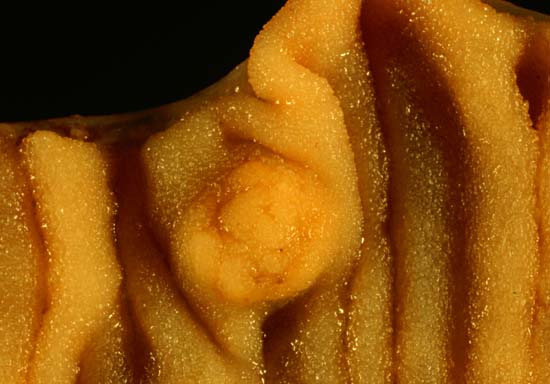Carcinoid Tumor

A carcinoid tumor is a type of neuroendocrine tumor that usually develops in the digestive (GI) tract (such as the stomach or intestines) or in the lungs. In some cases, a carcinoid tumor develops in another part of the body, such as the pancreas, testicle (in men), or ovary (in women). It is a slow-growing tumor that typically does not cause symptoms in the early stages, so a person may have the tumor for years before being diagnosed. In later stages, symptoms may vary depending on where the tumor is located. Symptoms of a GI carcinoid tumor may only develop if the tumor has spread to the liver. The tumor may produce hormone-like substances that spread to the body and cause symptoms of carcinoid syndrome, such as flushing of the face and chest, diarrhea, and trouble breathing. People with a lung carcinoid tumor are less likely to have carcinoid syndrome, but may experience coughing, wheezing, or pneumonia. The tumor may also cause various symptoms if it has spread to other parts of the body.
The cause of carcinoid tumors is unknown, but certain unavoidable risk factors may increase a person's chance of developing a carcinoid tumor. In general, cancer develops when a cell randomly develops mutations in its DNA. Surgery to remove the tumor is the main treatment and can typically cure the tumor if it has not spread to other parts of the body. Other treatment options may include radiation therapy, chemotherapy, and targeted therapy.
The cause of carcinoid tumors is unknown, but certain unavoidable risk factors may increase a person's chance of developing a carcinoid tumor. In general, cancer develops when a cell randomly develops mutations in its DNA. Surgery to remove the tumor is the main treatment and can typically cure the tumor if it has not spread to other parts of the body. Other treatment options may include radiation therapy, chemotherapy, and targeted therapy.